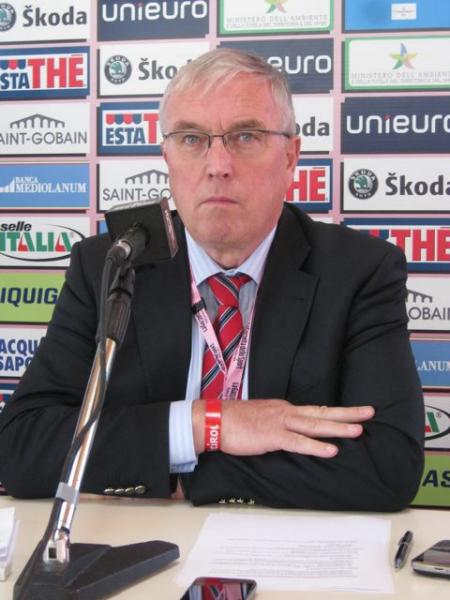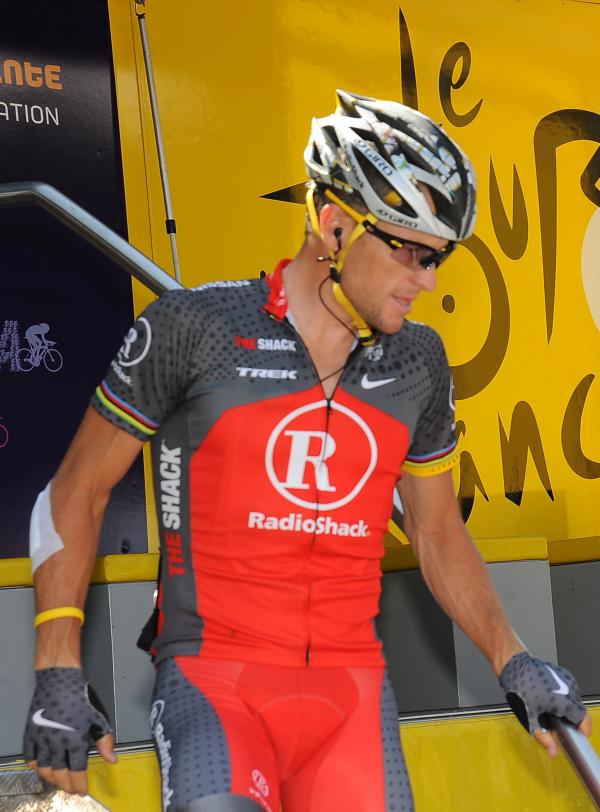McQuaid reveals Armstrong made two donations to the UCI
President insists Armstrong has never had favourable treatment


The president of the International Cycling Union Pat McQuaid has revealed to Cyclingnews that Lance Armstrong made not one, but two donations to the UCI. Speaking to Cyclingnews during a visit to Britain, McQuaid said that the seven-time Tour de France winner signed a personal cheque for $25,000 in 2002 and then his management company Capital Sports and Entertainment made a second payment of $100,000 in 2005.
In recent weeks McQuaid has come under fire for the UCI accepting donations from Armstrong, who is still competing and so still faces regular anti-doping tests. Any donations could lead to a possible conflict of interest and McQuaid admitted during the Giro d'Italia that in hindsight, accepting Armstrong's donation may have been a mistake.
Looking to deflect any possible accusations of favouritism, especially with Armstrong at the centre of a widening investigation following the doping accusations made by Floyd Landis, the UCI has dug through its archives.
McQuaid showed Cyclingnews a photocopy of the invoice of the Sysmex blood testing machine that a large part of Armstrong $100,000 donation was used to buy. He refused to let us take a photograph of it, keeping it in a file marked 'Confidential'.
"I said during the Giro d'Italia in May that we were going to investigate and look into the archives to discover exactly what happened. That's what we've done," McQuaid said.
"Armstrong said he paid $25,000 but I also knew he paid $100,000,” he added. “There was other speculation about amounts but they were way out. We've now found out exactly what was donated by looking at our records in detail. They show that Lance, in May 2002, paid a personal cheque, signed by himself and his wife, for $25,000. That went into the funds of what was then the Anti-Doping Council. They decide to use the money for anti-doping tests on juniors, to separate it from Armstrong, because he was racing at the time. We have record of the four or five races where special tests were done. It was all budgeted and paid for.
"Then in 2005, just at the time Armstrong retired, he promised $100,000. At that time we needed a Sysmex machine, so we ordered it and we paid for it based on the pledge he had made. Why it took him so long to eventually pay up I don't know, you'd have to ask him. It came from his company CSE. And the fact that the $100,000 came from CSE explains to me why he said $25,000. He may not have directly known about the later $100,000 donation."
The latest race content, interviews, features, reviews and expert buying guides, direct to your inbox!
Defending Lance
McQuaid has often defended Armstrong, yet has been openly critical of Floyd Landis even if the World Anti-Doping Agency is doing everything it can to assist the investigation to his allegations. McQuaid justifies his support for Armstrong because of the huge public and media attention he brings to cycling.
"I defend Lance because he's one of the greatest athletes in our sport but I would vehemently deny that he has ever received any favourable treatment from us," McQuaid said. “There are several reasons why I do that. First of all, he's an incredible athlete. He was the youngest ever world champion at just 21, he then went on to win seven Tour de Frances. He's also involved in saving peoples’ lives with the work he does against cancer.
"Then if you look at cycling, there have only been two truly global stars: Eddy Merckx and Lance Armstrong,” he added. “If you go Kuala Lumpur, the man in the street would know who Lance Armstrong is. If you ask him who Fabian Cancellara is, he wouldn't have a clue.
"That's why I'm happy to work with him to help develop the sport of cycling. It's only normal that as we try and globalise the sport, we have good relation with the biggest star of the sport. Every sport does that. It doesn't mean he gets different treatment. Everyone still has to follow rules. Lance does all the tests like everyone else and there's absolutely nothing wrong with his biological passport."
McQuaid: UCI has nothing to hide
McQuaid insists that he is not worried about the alleged US Federal investigation sparked by Landis' accusations against Armstrong and other former teammates during his time at the US Postal Service team.
"We haven't been contacted by anyone in the USA, but if we are, we'll tell them everything we know. They can study our books. We've nothing to hide," he said. "Obviously it'd be a worry if becomes a long drawn out investigation and then nothing happens. Look at the Balco investigation. That cost the US government 50 million dollars and what did it achieve at the end of the day?
"I believe that it's up to the authorities and the scientific community to catch these guys while they're doing it,” he added. “Re-opening things from the past and spending a lot of time and a lot of money isn't the answer."
"Doping has been going on in sport for centuries. Do we really want to go backwards all the time and keep opening investigations for accusation that someone makes? I'd rather concentrate on the present and future. Since becoming UCI President I've tried to work on today and tomorrow. That's where I we can make a difference."

Stephen is one of the most experienced member of the Cyclingnews team, having reported on professional cycling since 1994. He has been Head of News at Cyclingnews since 2022, before which he held the position of European editor since 2012 and previously worked for Reuters, Shift Active Media, and CyclingWeekly, among other publications.